| Srl | Item |
| 1 |
ID:
128563
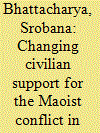

|
|
|
|
|
| Publication |
2013.
|
| Summary/Abstract |
Prolonged domestic political conflicts change over time. The Maoist conflict in India which began in the late 1960s is one such conflict. Over time, the 'old' Maoist conflict has become a 'new' Maoist conflict. Important changes have occurred both in the macro and micro processes of the conflict. Some of these changes include the strategic relocation of the Maoist bases, a shift in the class character of the conflict, the nature of civilian support, and the rebels' methods of operation. While in the 1960s, the conflict was involved in land redistribution with the aim of annihilating class enemies, the recent conflict focuses on caste identities. In addition, it is intrinsically linked with territorial control and local political competition. This has automatically led the Maoists to become involved with local criminal networks and also local business networks based. This involvement has led to financial resources for the conflict. Furthermore, it has forced the local population to become linked with the conflict. Studying these changes is important, especially for counterinsurgency policies.
|
|
|
|
|
|
|
|
|
|
|
|
|
|
|
|
| 2 |
ID:
139884
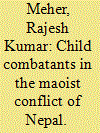

|
|
|
|
|
| Summary/Abstract |
After a decade long Maoist armed conflict, Nepal witnessed an end to the century old Monarchy thereby making Nepal one of the youngest independent, democratic sovereign states in the world. In this back drop the question arises, is there any rationale behind studying the child recruitment by the Maoist during the decade long Maoist armed conflict in Nepal that systematically began in 1996? However, the answer is in affirmation.
|
|
|
|
|
|
|
|
|
|
|
|
|
|
|
|
| 3 |
ID:
097336
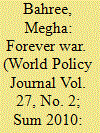

|
|
|
| 4 |
ID:
112358
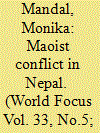

|
|
|
| 5 |
ID:
121895
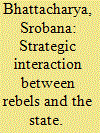

|
|
|
|
|
| Publication |
2013.
|
| Summary/Abstract |
The "people's war" in Nepal during 1996-2006, led to two significant outcomes-the elimination of monarchy and political victory for the Maoists. These political outcomes raise important questions about the process of Maoist conflict in Nepal. While several studies on political conflict are concerned about "why" such conflicts happen, I focus on "how" the strategy of conflict unfolded in Nepal. In this article, I argue that strategic interaction between rebels and the state explain why the conflict led to negotiated settlement in Nepal. To discuss the sequence of rebel-state interaction, I introduce a game theoretic model. In addition, I show how territorial control, target selection, and levels of violence used by the rebels in comparison to the state are crucial in understanding the conflict process. The case study in this article analyzes the relevance of rebel-state interaction to reveal micro processes of political conflict and further suggests that negotiation can become an important tactical choice in resolving conflict.
|
|
|
|
|
|
|
|
|
|
|
|
|
|
|
|
| 6 |
ID:
154546
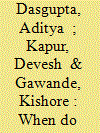

|
|
|
|
|
| Summary/Abstract |
Theory and extensive evidence connect poverty and underdevelopment to civil conflict yet evidence on the impact of development programs on violence is surprisingly mixed. To break this impasse, we exploit a within-country policy experiment to examine the conditions under which antipoverty programs reduce violence. The roll-out of India's National Rural Employment Guarantee Scheme caused a large long-run reduction in Maoist conflict violence, as measured with an original data set based on local-language press sources. These pacifying effects were not uniform, however, but overwhelmingly concentrated in districts with sufficient pre-existing local state capacity to implement the program effectively. The results demonstrate the potential for anti-poverty programs to mitigate violent civil conflict by improving livelihoods, but also highlight the crucial role of state capacity in shaping these effects.
|
|
|
|
|
|
|
|
|
|
|
|
|
|
|
|